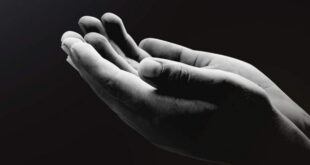Bathe Yourself with Money!
– Extracted from a Speech by Muhammad Alshareef
Have you ever seen someone run out of the masjid immediately after salah. In fact, the imam may barely have said salam, and this person is already standing up, getting ready to take off (you may have seen this after the Jumu’ah prayers). When we see someone in such haste, we know that there is some affair that pre-occupied the brother or sister and that haste is indeed a weighty matter.
But now let’s ask ourselves a question:
Who amongst us would jump like that because we delayed the paying of a voluntary sadaqah? Who?
It is the most God-fearing person who would do so – RasulAllah sal Allaahu alayhi wa sallam.
In Sahih Bukhari, ‘Uqbah radi Allahu anhu narrates, “I offered the ‘Asr prayer behind the Prophet at Madinah. When he had finished the prayer with Taslim, he got up hurriedly and went out by crossing the rows of the people to one of the dwellings of his wives. The people got scared at his speed . The Prophet came back and found the people surprised at his haste and said to them, “I remembered a piece of gold Lying in my house and I did not like it to divert my attention from Allah’s worship, so I have ordered it to be distributed (in charity).”” (Sahih Bukhari, Book #12, Hadith #810)
If RasulAllah sal Allaahu alayhi wa sallam attached such importance to sadaqah, voluntary charity, then what about zakat, one of the five pillars of Islam?
In the year before the Farewell Hajj, RasulAllah sal Allaahu alayhi wa sallam sent a group of Muslims on Hajj with Abu Bakr as their ameer. There were still some mushrikeen performing Hajj in Makkah, and some of them were circumambulating the Kaaba naked. Abu Bakr’s mission, radi Allahu anhu, was to prepare Makkah for the Hajj of RasulAllah sal Allaahu alayhi wa sallam.
Allah’s Messenger sal Allaahu alayhi wa sallam sent Surah Bara’ah (also known as Surah Tawbah), the 9th surah in the Quran, along with Abu Bakr, instructing him that it was to be recited to all those performing the Hajj that year. Ali ibn Abu Talib was given the task of announcing the surah due to his position amongst the Quraysh.
The surah, begins as follows:
“A (declaration) of immunity from Allah and His Apostle, to those of the Pagans with whom ye have contracted mutual alliances:-“ (surah Al Tawbah 9:1)
Remember, the Quran was the Islamic state’s declaration of legislation. Ali ibn Abu Talib radi Allahu anhu continued to recite until he reached the words of Allah:
“But (even so), if they repent, establish regular prayers, and practise regular charity (zakat),- they are your brethren in Faith:…” (surah Al Tawbah 9:11)
In other words, it was not sufficient for them to simply repent; it was also compulsory for them to establish salah and zakat, and then only could they be considered to be within the brotherhood of Islam.
Bukhari and Muslim report that Jarir bin ‘Abdullah narrates that: “I gave the pledge of allegiance to Allah’s Apostle for to offer prayers perfectly, to pay Zakat regularly, and to give good advice to every Muslim.” (Sahih Bukhari, Book #10, Hadith #502)
After the death of RasulAllah sal Allahu alayhi wa sallam, the ummah was faced with some who claimed prophethood, men with huge tribes waiting to fight the Muslims. Then, to a lesser degree, there were tribes who still professed to be Muslim, but who had a ‘problem’ with giving zakat.
The ummah needed to take action. While some of the Sahaba felt that they should just leave the ‘we-are-Muslim-minus-zakat’ people, and focus on the armies instead, Abu Bakr radi Allahu anhu disagreed. “I swear by Allah,” he said, “I shall go to war and fight anyone who attempts to separate salah from zakat!”
Upon hearing this, Umar radi Allahu anhu commented, “By Allah, at the moment when I saw that Allah had opened the heart of Abu Bakr to this war, I knew that it was the truth.”
Allah made the giving of zakat on the wealth of believer compulsory for him as a test of his sincerity. The believer has full conviction that it is fardh (obligatory) and knows that zakat is the third pillar of Islam, and not merely a virtuous option. Without zakat the deen of a believer will collapse.
The believer delivers his zakat with an open heart, thanking and praising Allah for His bounty and for the very tawfeeq of being able to perform his duty.
So while others bathe their bodies daily, it is possible for us to bathe our hearts with money. How? Zakat.
In Arabic, the word zakat carries the connotation of cleanliness – to purify. In Shari’ah, zakat deals with the wealth Allah gave to His servants. It is the fardh (obligatory) percentage one must impart to whom it is due.
Allah ta’ala teaches us the virtue of zakat in the following ayah:
“Take (O Muhammad) from their wealth a charity by which it purifies them and causes them increase…” (Surah Al Tawbah 9:103)
How do zakat and voluntary charity cleanse a person?
1. By cleansing the heart from the diseases of hypocrisy and doubt.
2. By cleansing the heart from the disease of stinginess.
3. By bathing the remaining wealth with barakah.
4. By bathing the good character of the one giving and increasing his or her wealth.
As Rasul Allah sal Allahu alayhi wa sallam said, “Charity never decreases wealth.”
“If I win a million dollars I’ll give half to the masjid!” Ever heard that du’a before?
Allah ta’aala teaches us that the nature of humans is to attach themselves to coins of gold and silver. In fact, they pray day and night for it. In their prayers, they promise that if they are indeed blessed with the wealth, they will be unselfish with that gift. But when a test befalls them, they turn their backs:
“Amongst them are men who made a covenant with Allah, that if He bestowed on them of His bounty, they would give (largely) in charity, and be truly amongst those who are righteous. But when He did bestow of His bounty, they became covetous, and turned back (from their covenant), averse (from its fulfilment). So He hath put as a consequence hypocrisy into their hearts, (to last) till the Day, whereon they shall meet Him: because they broke their covenant with Allah, and because they lied (again and again). Know they not that Allah doth know their secret (thoughts) and their secret counsels, and that Allah knoweth well all things unseen?” (Surah Al Tawbah 9:75-78)
Yayha ibn Mu’adh rahimahullah commented, “I have always been amazed at someone who has wealth, yet is stingy. His Lord, who gave the wealth to him, requests that he loan part of it to Him and the stingy man says, ‘No.’”
Zakat is an obligation connected to wealth. When someone delays the paying of zakat, that obligation directly chains itself to the individual’s neck. In order for them to repent, they must give what Allah made obligatory upon them.
RasulAllah sal Allahu alayhi wa sallam taught us that when a people hoard wealth and do not give the zakat, they will be afflicted with a famine:
“There was never a people that refused to give zakat except that Allah afflicted them with famine” (Bayhaqi)
He, sal Allahu alayhi wa sallam, warned us of stinginess because of the destruction it brings:
“Beware of stinginess for verily those who came before you were destroyed because of it” (Abu Dawood)
And on the Day of Resurrection, the zakat that was not paid will be a means of punishment for the individual:
“And let not those who covetously withhold of the gifts which Allah Hath given them of His Grace, think that it is good for them: Nay, it will be the worse for them: soon shall the things which they covetously withheld be tied to their necks Like a twisted collar, on the Day of Judgment. To Allah belongs the heritage of the heavens and the earth; and Allah is well-acquainted with all that ye do.” (Surah Ali ‘Imran 3:180)
In Sahih Muslim, Abu Huraira radi Allahu anhu narrates that RasulAllah, sal Allahu alayhi wa sallam said:
“”If any owner of gold or silver does not pay what is due on him, when the Day of Resurrection would come, plates of fire would be beaten out for him; these would then be heated in the fire of Hell and his sides, his forehead and his back would be cauterized with them. Whenever these cool down, (the process is) repeated during a day the extent of which would be fifty thousand years, until judgment is pronounced among servants, and he sees whether his path is to take him to Paradise or to Hell.”…” (Sahih Muslim, Book #005, Hadith #2161)
Abdullah ibn Mas’ood radi Allahu anhu said, “Store your wealth where no worms will eat it, where it cannot be reached by thieves. Store it in sadaqah.”
Umm Al-Mu’mineen ‘A’isha radi Allahu anha once met a poor woman who was with her two daughters. In Sahih Muslim, ‘A’isha radi Allahu anha narrates: “A poor woman came to me along with her daughters. I gave her three dates. She gave a date to each of them and then she took up one date and brought that to her mouth in order to eat that, but her daughters expressed desire to eat it. She then divided the date that she intended to eat between them. This (kind) treatment of her impressed me and I mentioned that which she did to Allah’s Messenger (may peace be upon him). Thereupon he said: “Verily Allah has assured Paradise for her, because of (this act) of her, or He has rescued her from Hell-Fire.”” (Sahih Muslim, Book #032, Hadith #6363)
Indeed, not only are we giving zakat and sadaqah to cleanse ourselves; we do so in order to protect ourselves from Hellfire.
The general principle of zakat is that the first option is to give it to the needy of the locality. As RasulAllah sal Allahu alayhi wa sallam instructed Muadh when he sent him to Yemen.
Narrated by Ibn Abbas: “When Allah’s Apostle (peace be upon him) sent Muadh to yemen, he said (to him), “You are going to people of a (Divine) Book. First of all invite them to worship Allah (alone) and when they come to know Allah, inform them that Allah has enjoined on them, five prayers in every day and night; and if they start offering these prayers, inform them that Allah has enjoined on them, the Zakat. And it is to be taken from the rich amongst them and given to the poor amongst them; and if they obey you in that, take Zakat from them and avoid (don’t take) the best property of the people as Zakat.” (Sahih Bukhari, Book #24, Hadith #537)
The use of the word “amongst them” indicates the needy from within that community.
What we need to do is to actively go out there and find these people within our communities; find out how we can make a difference in their lives. In doing so we will strengthen our communities, and as our communities grow stronger, they will have the strength to assist others around the world.
Allah ta’aala has specified about the people who should get Zakat. No human being can decide for zakat money to be given to other than those whom Allah has specified.
Our communities, alhamdulillah, are blessed communities that give unselfishly. Zakat is often unfulfilled or hindered due to a lack of education on the subject as well as the absence of a proper zakat distribution system. All it takes to solve this is for one dedicated leader to establish a zakat distribution network in his area. Just one leader and all the zakat will reach those who need it.
“The believers must (eventually) win through,- Those who humble themselves in their prayers; Who avoid vain talk; Who are active in deeds of charity;” (Surah Al Mu’minun 23:1-4)
 navedz.com a muslim's Quest for the truth
navedz.com a muslim's Quest for the truth






